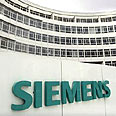
Siemens to reject new orders from Iran
As world powers consider imposing wider sanctions on Islamic Republic over its sensitive nuclear activity, German conglomerate says aware of sensitivities attached to doing business in Tehran, will not agree to any further orders with customers in Iran
German conglomerate Siemens said on Tuesday it had decided to reject any further orders from Iran as world powers consider imposing wider sanctions on Tehran over its sensitive nuclear activity.
Germany, one of six countries seeking to persuade Iran to suspend its atomic work, is one of the biggest exporters to Iran despite three rounds of modest United Nations sanctions.
Western nations suspect the Islamic Republic of trying to develop nuclear weapons capability, a charge Tehran denies. It argues that its uranium enrichment program is designed solely for electricity generation, not atomic bombs.
Iran ignored US President Barack Obama's end-2009 deadline to respond to an offer from world powers of economic and political incentives in exchange for halting enrichment.
German Chancellor Angela Merkel said on Tuesday Iran was running out of time if it wanted to avoid further sanctions.
Siemens was aware of the sensitivities attached to doing business in Iran, Chief Executive Peter Loescher said.
"Some time ago, we reduced our business activities with customers in Iran," Loescher said, responding to questions at a shareholders meeting.
The Siemens board decided at the start of October not to agree to any further orders with customers in Iran, he added, noting, however, that existing orders would be fulfilled.
Loescher said there were still bids submitted by Siemens before October 2009. If they were not accepted, it would mean new business in Iran would end by mid-2010.
Siemens, which makes high-tech machinery as well domestic appliances, generates an annual 500 million euros ($704.5 million) in sales from Iran, which last year represented 0.7% of the firm's overall sales.
Loescher said Siemens' trade with Iran was exclusively civilian.
'Time is running out'
German media have in the past reported that German authorities have investigated shipments of high technology to Iran to see if they may have violated export control laws.
One case, cited by Der Spiegel magazine in December, involved 16 million euros worth of turbo compressors found by customs inspectors in Hamburg that investors believe could be used in Iran's missile program.
Merkel, asked how Berlin could ensure its companies did not trade with Iran, said Germany had shown that many firms had scaled back their involvement in Iran.
"There is a long tradition of economic cooperation (between Germany and Iran). There has been a significant reduction. But we believe it is only effective if you try to introduce international sanctions on as broad a base as possible.
"Germany will adhere to sanctions in all sectors that are affected," she told a news conference with visiting Israeli President Shimon Peres.
Figures from last year show Berlin had significantly cut the value of new credit guarantees it offers firms that do business with Iran but that German exports to the country rose in 2008.
Merkel also warned Iran that it would have to act soon if it is to avoid a further, broader round of punitive sanctions.
"Time is running out," she said.
"The world community is ready to work on sanctions. We have shown patience but this doesn't seem to have had any effect so the time has come for the international community to discuss sanctions," Merkel said.
Envoys from the United States, France, Germany, Britain, Russia and China met this month to discuss further sanctions on Iran. But Russia and China, major trade partners of Iran, are both reluctant and want more negotiations.










